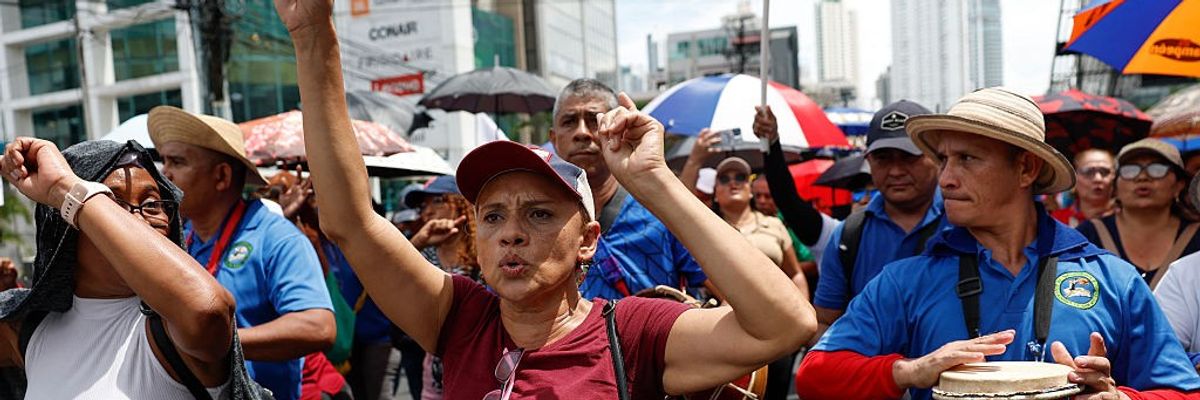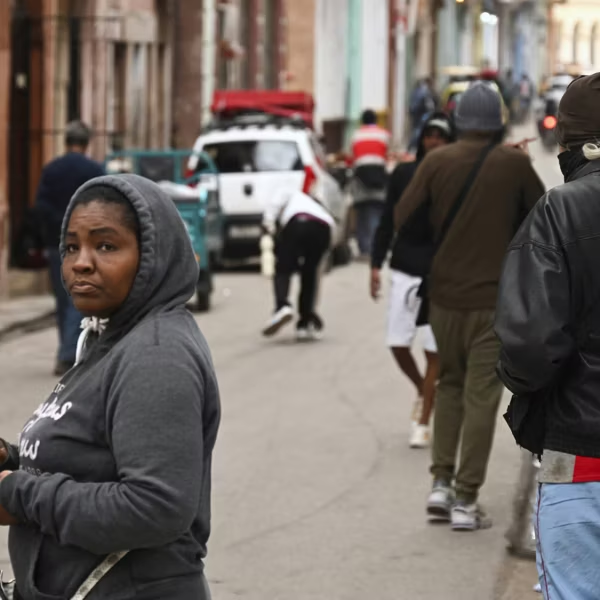
Workers take part in a protest against the government of President José Raúl Mulino amid an indefinite strike in Panama City on May 20, 2025.
US Banana Giant Chiquita Fires Thousands of Striking Workers in Panama
The Chiquita workers' strike is part of a nationwide protest movement against pension reforms approved by Panama's right-wing government.
The U.S.-headquartered banana giant Chiquita said Thursday that it moved to fire thousands of Panamanian workers who walked off the job last month as part of nationwide protests against the right-wing government's unpopular reforms to the nation's pension system.
Citing an unnamed source close to Chiquita, Reuters reported that the mass firings are expected to impact around 5,000 of the company's 6,500 Panamanian workers. José Raúl Mulino, Panama's right-wing president, defended the banana giant formerly known as United Fruit, accusing striking workers of unlawful "intransigence."
The company estimates that the strike, which began in late April, has cost it at least $75 million.
The pension reforms, known as Law 462, sparked outrage across Panama, with unions and other groups warning the changes would result in cuts to retirement benefits, particularly in the future for younger workers. The law transitions the country's pension system to an individual account structure that opponents say will be far less reliable than its predecessor.
"With the previous legislation, we could retire on 60% to 70% of our salary. Now, with the new formula, that amount drops to just 30% to 35%," said Diógenes Sánchez of Panama's main teachers' union. "It's a starvation pension."
The Associated Press noted Thursday that in recent weeks, "marches and occasional roadblocks have stretched from one end of the country to the other as teachers, construction workers, and other unions expressed their rejection of changes the government said were necessary to keep the social security system solvent."
An Urgent Message From Our Co-Founder
Dear Common Dreams reader, The U.S. is on a fast track to authoritarianism like nothing I've ever seen. Meanwhile, corporate news outlets are utterly capitulating to Trump, twisting their coverage to avoid drawing his ire while lining up to stuff cash in his pockets. That's why I believe that Common Dreams is doing the best and most consequential reporting that we've ever done. Our small but mighty team is a progressive reporting powerhouse, covering the news every day that the corporate media never will. Our mission has always been simple: To inform. To inspire. And to ignite change for the common good. Now here's the key piece that I want all our readers to understand: None of this would be possible without your financial support. That's not just some fundraising cliche. It's the absolute and literal truth. We don't accept corporate advertising and never will. We don't have a paywall because we don't think people should be blocked from critical news based on their ability to pay. Everything we do is funded by the donations of readers like you. Will you donate now to help power the nonprofit, independent reporting of Common Dreams? Thank you for being a vital member of our community. Together, we can keep independent journalism alive when it’s needed most. - Craig Brown, Co-founder |
The U.S.-headquartered banana giant Chiquita said Thursday that it moved to fire thousands of Panamanian workers who walked off the job last month as part of nationwide protests against the right-wing government's unpopular reforms to the nation's pension system.
Citing an unnamed source close to Chiquita, Reuters reported that the mass firings are expected to impact around 5,000 of the company's 6,500 Panamanian workers. José Raúl Mulino, Panama's right-wing president, defended the banana giant formerly known as United Fruit, accusing striking workers of unlawful "intransigence."
The company estimates that the strike, which began in late April, has cost it at least $75 million.
The pension reforms, known as Law 462, sparked outrage across Panama, with unions and other groups warning the changes would result in cuts to retirement benefits, particularly in the future for younger workers. The law transitions the country's pension system to an individual account structure that opponents say will be far less reliable than its predecessor.
"With the previous legislation, we could retire on 60% to 70% of our salary. Now, with the new formula, that amount drops to just 30% to 35%," said Diógenes Sánchez of Panama's main teachers' union. "It's a starvation pension."
The Associated Press noted Thursday that in recent weeks, "marches and occasional roadblocks have stretched from one end of the country to the other as teachers, construction workers, and other unions expressed their rejection of changes the government said were necessary to keep the social security system solvent."
The U.S.-headquartered banana giant Chiquita said Thursday that it moved to fire thousands of Panamanian workers who walked off the job last month as part of nationwide protests against the right-wing government's unpopular reforms to the nation's pension system.
Citing an unnamed source close to Chiquita, Reuters reported that the mass firings are expected to impact around 5,000 of the company's 6,500 Panamanian workers. José Raúl Mulino, Panama's right-wing president, defended the banana giant formerly known as United Fruit, accusing striking workers of unlawful "intransigence."
The company estimates that the strike, which began in late April, has cost it at least $75 million.
The pension reforms, known as Law 462, sparked outrage across Panama, with unions and other groups warning the changes would result in cuts to retirement benefits, particularly in the future for younger workers. The law transitions the country's pension system to an individual account structure that opponents say will be far less reliable than its predecessor.
"With the previous legislation, we could retire on 60% to 70% of our salary. Now, with the new formula, that amount drops to just 30% to 35%," said Diógenes Sánchez of Panama's main teachers' union. "It's a starvation pension."
The Associated Press noted Thursday that in recent weeks, "marches and occasional roadblocks have stretched from one end of the country to the other as teachers, construction workers, and other unions expressed their rejection of changes the government said were necessary to keep the social security system solvent."

